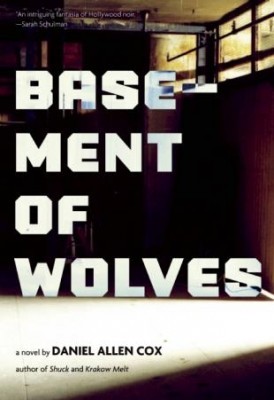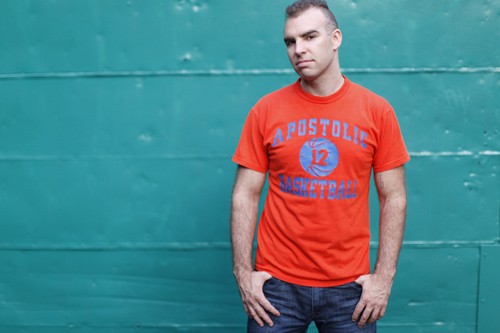When you sit down to talk books with Daniel Allen Cox, you’re never quite sure what’s going to happen, all you can be sure of is that it’s going to be interesting.
This is the time for full disclosure: in 2010 I worked closely with Daniel when he was my mentor for the Quebec Writers’ Federation’s fantastic Mentorship Program. Over four months Daniel helped me coax a novel out of my head and we had a blast. When I listen now to the recordings I made of our meetings I can see how we slid from topic to topic in what seemed like a serendipitous way – and yet he was constantly underscoring the importance of craft, goals, and structure.

Basement of Wolves
Daniel Allen Cox
Arsenal Pulp Press
$15.95
paper
151pp
9781551524467
Rob Sherren: What made you want to write about Hollywood and an actor turning 40?
Daniel Allen Cox: Los Angeles fascinates me. Downtown Hollywood is a strange place. Once I was shopping for vinyl at Amoeba Music when the floor started to shake. I assumed the vibrations were from the Steely Dan [gig] the store was hosting next door, but my friend confirmed it was a tremor. And the movies have always fascinated me. It was time to work my love of film into my artistic practice.
RS: Michael-David is perhaps your most neurotic character to date. How did it feel to be inside his head?
DAC: It’s not difficult for me to enter a state of neurosis when writing. I imagine it’s some kind of precondition, given the number of assumptions, transpositions, projections, and predictions that writers carry from page to page.
RS: As the inertia of the novel’s movie takes hold, Michael-David feels helpless, like he’s a victim of the film’s destination rather than its agent. Some novelists speak of the same thing happening to their projects, while others famously declare their characters to be galley slaves who do their exact bidding. How is it for you?
DAC: It depends on the book. Basement of Wolves was the least planned of my books. It began as a very ominous feeling that I just ran ahead with, and then somehow gave faces to the feelings, and turned it all into something resembling a book.
RS: Your characters often have atypical relationships with public buildings and spaces: I’m thinking of Shuck’s narrator sleeping in a shoe store; Krakow Melt’s parkour pyro; Tim in this book haunts an la tourist hotel. They feel to me like urban hackers who re-task architecture for their own purposes. Is there a line of subversion or social commentary that runs through these characters or something else completely?
DAC: I suppose most of my characters want to configure the cityscape to suit their personalities and, in some cases, their political and ideological ends. That could be it. I should be doing more of that. Subversion can take many forms. I was recently talking to an urban planner friend about “desire paths”: routes formed when people ignore planned walkways and instead cut their own through lawns, etc., because it feels right.
RS: The incredibly poetic passage about rimming suggests that the act has the power to prevent wars and geopolitical unrest, “… all it takes is a little lick.” If we are to save this planet, what contemporary ass is in most desperate need of a good rim job?
DAC: This scene appears to be making the rounds. The idea of achieving world peace through the asshole is not a new idea – see “The Purple Resistance Army Manifesto” by Bruce LaBruce. I could list a bunch of Conservative politicians who could use a rim job, but at this point that might already be cliché. What I’m really thinking about is international dipl macy. Could tongues have melted the Cold War?
RS: At a certain point, the future of the novel’s film seems to hang on the balance of a studio maintenance man’s opinion. How often do you think life turns on precariously serendipitous moments?
DAC: Rob, all the time! I think every life turn is serendipitous. When we consider an event banal, it’s probably our lack of imagination about how every moment is the result of a mind- blowing series of twists and turns. We have let the mundane take too much control of our lives. Enough!
RS: Chapter five is the beginning of a daring point-of-view experiment. Chris Culpepper’s chapters could easily have been told from a conventional perspective, but you specifically remind readers that what you’re doing is intentional. Can you talk a bit about the thought processes that went into choosing to do it this way, and the opportunities and challenges it presented?
DAC: The POV in this book wasn’t planned, it was a resolution to a problem – an attempt to make two different stories work together; a total improvisation and risk. I’m grateful to have writing mentors and my editor to confer with about this tricky sort of stuff.
RS: I know you’re a vinyl aficionado (I’ve heard your copy of Jim and Tammy Faye Bakker’s Building on the Rock album); do you write or edit to music, and if so, were there any albums that influenced this book?
DAC: Yeah, I try to pick up weird used vinyl when I can. I always listen to music when writing a first draft, to keep the energy flowing and my mind open. I put The Art of Noise into heavy rotation last year. But I never listen to music while editing. I need to read the sentences out loud to hear if they work.
RS: Your books have taken on some of the world’s great cities: New York City, Krakow, and now Los Angeles. Your hometown, Montreal, has been looking at you all night – when are you going to drop the gloves, tear off your shirt, and throw down with it in the alley?
DAC: This is the question I get asked the most, and you know what? I answer it differently every time! I’ve been in the city streets a lot these days, and I find more energy here than ever before. Historically, that’s been a potent writing catalyst for me. We’ll see what happens. mRb







0 Comments